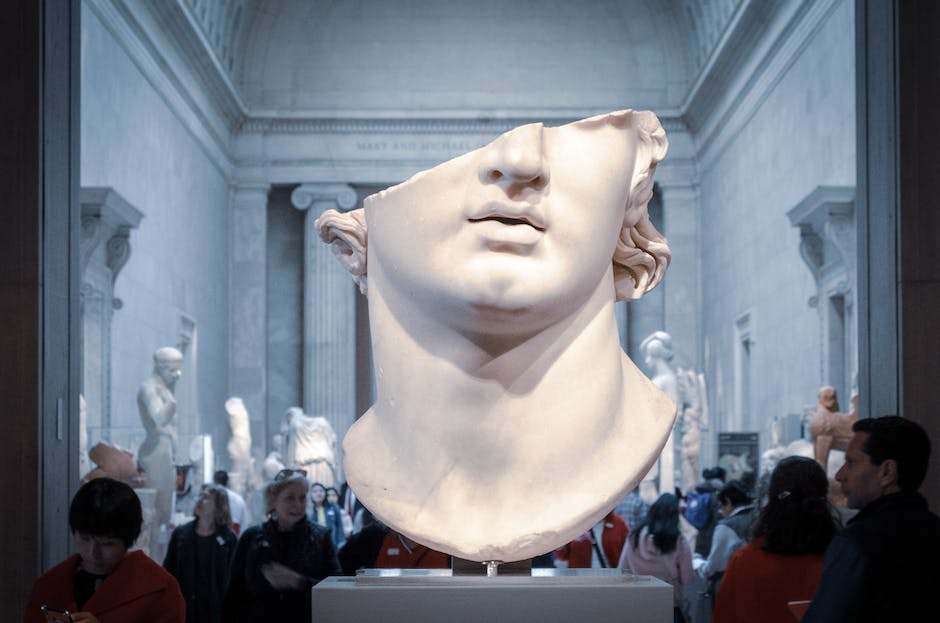Once upon a time, in the land of the moderns, stood a treasure trove of ancient tales, myths woven deep within the tapestry of human imagination. Greek mythology, a labyrinth of gods and heroes, continues to captivate hearts even in this digital era. From the humble scrolls to the silver screen, these legendary tales have found a new lease on life, embraced by pop culture with open arms. Join me, dear reader, as we embark on a whimsical journey through the intertwining realms of ancient lore and present-day storytelling, where Percy Jackson wields a mighty pen and Wonder Woman battles mythical monsters. Brace yourselves, for we are about to uncover how the gods and goddesses of old have seamlessly infiltrated our contemporary world, shaping our beloved pop culture landscape in the most mesmerizing ways.
Bringing Ancient Gods to the Modern World: The Popularity of Greek Mythology in Pop Culture
Greek mythology has enjoyed a remarkable resurgence in popular culture, captivating audiences with its timeless tales of gods, heroes, and mythical creatures. From books to movies to video games, the influence of Greek mythology can be seen and felt in numerous forms of entertainment today. One notable example is Rick Riordan’s best-selling series, Percy Jackson and the Olympians, which follows the adventures of a young demigod in a modern-day world where Greek gods and monsters still exist. This captivating series has not only introduced a new generation to the enchanting world of Greek mythology, but it has also inspired a successful film adaptation and an upcoming television series, further cementing the enduring popularity of these ancient gods.
The allure of Greek mythology can also be seen in the realm of comic books and superheroes. One of the most iconic superheroine of all time, Wonder Woman, draws heavily from Greek mythology. Created by William Moulton Marston in 1941, this powerful and resilient character is directly inspired by the Amazons of Greek mythology. Wonder Woman’s origin story, powers, and even her iconic bracelets can be traced back to Greek mythology, specifically the stories of the Amazons and the goddesses of Olympus. This merging of ancient mythology with modern superhero storytelling has not only made Wonder Woman a beloved character but also deepened the connections between Greek mythology and contemporary pop culture.
Unleashing Demigods and Monsters: The Influence of Percy Jackson on Contemporary Entertainment
Greek mythology has indubitably left an everlasting imprint on contemporary entertainment, with notable works such as Percy Jackson and Wonder Woman embodying the essence of this fascinating ancient realm. Among these fantastical tales, the impact of Percy Jackson’s adventurous chronicles cannot be overlooked. The series, penned by Rick Riordan, has remarkably reignited the younger generation’s love for Greek mythology, introducing them to a realm filled with demigods, monsters, and epic quests that rival those of the ancient Greeks.
Thanks to Percy Jackson, Greek mythology has been effortlessly blended with modernity, captivating audiences around the world. The books have paved the way for a surge of Greek mythology-inspired content in popular culture, transcending literature and finding its place in the realms of film, television, and even video games. From the silver screen adaptations to inspiring spin-offs and animated series, the influence of Percy Jackson can be seen far and wide, captivating both young and old with its mystical narratives, empowering characters, and timeless adventures rooted in the rich tapestry of ancient Greece.
This newfound fascination with Greek mythology paved the way for other notable works, such as Wonder Woman. Taking inspiration from the Amazonian mythology, Wonder Woman effortlessly blends ancient legends with contemporary storytelling, showcasing the strength, courage, and resilience of powerful women. Gal Gadot’s portrayal of Diana Prince not only serves as a symbol of female empowerment but also immerses audiences in the captivating world of Greek mythology, bridging the gap between ancient lore and modern heroism. Wonder Woman stands as a testament to Greek mythology’s enduring influence in shaping and inspiring contemporary entertainment.

The Goddesses of Justice: How Wonder Woman Revives Greek Mythology in the Superhero Genre
Greek mythology has long captivated audiences with its tales of gods, heroes, and epic battles. From Percy Jackson to Wonder Woman, these ancient stories continue to find new life in pop culture. In particular, Wonder Woman stands out as a powerful representation of the goddesses of justice from Greek mythology.
Known as the Amazons, Wonder Woman’s tribe is a direct homage to the legendary race of women warriors of Greek mythology. Led by Hippolyta, Queen of the Amazons and mother of Wonder Woman, these fierce warriors share a deep connection to the goddesses of justice. One notable goddess is Athena, who is often associated with wisdom, war, and strategic warfare. In Wonder Woman, we see Athena’s influence in the character’s intellect, astute battle tactics, and unwavering determination to protect the innocent.
- Another prominent goddess in Wonder Woman’s mythos is Artemis, the goddess of the hunt and protector of young girls.
- Her presence can be seen in Wonder Woman’s exceptional archery skills and her commitment to defending those who cannot defend themselves.
- Finally, we have Themis, the goddess of divine law and order, ensuring justice is upheld.
These goddesses not only provide a rich mythology for Wonder Woman’s story, but also serve as symbols of strength, virtue, and the ongoing relevance of Greek mythology in the superhero genre. Wonder Woman’s embodiment of these goddesses’ qualities reflects her status as a modern-day champion of justice and equality, inspiring audiences around the world.

A Mythological Renaissance: Must-Watch TV Shows and Movies that Incorporate Greek Mythology
Transporting us to a world of gods and heroes, Greek mythology has captivated audiences for centuries. Its timeless tales continue to inspire and entertain, becoming a prominent feature in popular culture today. From the thrilling adventures of Percy Jackson to the empowering journey of Wonder Woman, there’s an abundance of must-watch TV shows and movies that beautifully incorporate the rich tapestry of Greek mythology.
Immersed in a sea of fantastical stories, one standout series is “American Gods.” Based on Neil Gaiman’s novel, this visceral TV show intricately weaves ancient Greek myths into contemporary society, exploring the clash of old and new gods. With powerful deities like the cunning Mr. Wednesday (Odin) and the mischievous Bilquis (associated with the Queen of Sheba and Ishtar), “American Gods” offers a unique perspective, challenging our perceptions of faith and belief in the modern world.
Another enchanting portrayal of Greek mythology can be found in the film “The Odyssey.” Directed by Jérôme Salle, this modern retelling of Homer’s classic epic takes us on a visually stunning voyage, where we witness the iconic hero Odysseus battling mythical creatures and gods to reach his homeland. The movie offers a refreshing and visually impeccable interpretation, breathing new life into the iconic story that has shaped Western literature for centuries.
To Conclude
As we bid farewell to the enchanting world of Greek mythology infused in popular culture, we can’t help but marvel at the journey we have undertaken together. From the spellbinding tales of gods and heroes etched in ancient scrolls to the vibrant tapestry of their existence woven into our modern world, Greek mythology has undoubtedly endured the test of time.
Through the pages of Rick Riordan’s beloved Percy Jackson series, we rediscovered the extraordinary lives of demigods as they navigated the treacherous terrain of Mount Olympus and the mortal realm. We laughed, we cried, and we fell in love with these captivating characters who effortlessly carved a place in our hearts.
In the shimmering halls of Hollywood, Greek mythology took on a new dimension. Flickering across the silver screen, we witnessed the bravery of Perseus as he battled colossal beasts in “Clash of the Titans.” We marveled at the rise of Wonder Woman, an Amazonian goddess who reminded us of the indomitable strength within ourselves. These cinematic adaptations, with their larger-than-life heroes and awe-inspiring landscapes, transported us to realms only previously imagined.
But Greek mythology did not stop there; it manifested itself in unexpected places. We found its vibrant presence in artworks exhibited in prestigious museums, where ancient figures appeared unshakeable and undying. We heard echoes of ancient tales in the lyrics of modern songs, intertwining the old with the new, reminding us that myths are not fleeting but seamlessly integrated into the very fabric of our daily lives.
As we close the chapter on this exploration of Greek mythology in pop culture, let us not forget the lessons and wisdom that have been passed down through the ages. Let us remember that we all possess the potential for heroism, that the gods were flawed and human in their own way, and that the beauty and complexity of these ancient tales continue to inspire creators and captivate audiences.
So, whether you find yourself intrigued by the legends of gods and demigods or merely drawn to the allure of fantastical stories, remember that Greek mythology’s power lies not only in the magic of its stories but in its ability to connect us to our shared human experiences.
In a world that often finds itself estranged from the mythical and the extraordinary, Greek mythology serves as a gentle reminder that, deep within all of us, lies a spark of divine brilliance waiting to be ignited. So go forth, dear reader, and may the legacy of Greek mythology forever guide your steps and illuminate your path.

